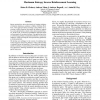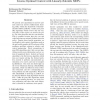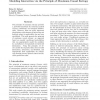6 search results - page 1 / 2 » Maximum Entropy Inverse Reinforcement Learning |
AAAI
2008
13 years 7 months ago
2008
Recent research has shown the benefit of framing problems of imitation learning as solutions to Markov Decision Problems. This approach reduces learning to the problem of recoveri...
ICML
2010
IEEE
13 years 5 months ago
2010
IEEE
We present new algorithms for inverse optimal control (or inverse reinforcement learning, IRL) within the framework of linearlysolvable MDPs (LMDPs). Unlike most prior IRL algorit...
ICML
2010
IEEE
13 years 5 months ago
2010
IEEE
The principle of maximum entropy provides a powerful framework for statistical models of joint, conditional, and marginal distributions. However, there are many important distribu...
IROS
2009
IEEE
13 years 11 months ago
2009
IEEE
— We present a novel approach for determining robot movements that efficiently accomplish the robot’s tasks while not hindering the movements of people within the environment....
CORR
2011
Springer
12 years 11 months ago
2011
Springer
Modeling the behavior of imperfect agents from a small number of observations is a difficult, but important task. In the singleagent decision-theoretic setting, inverse optimal co...



